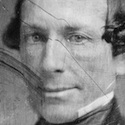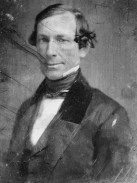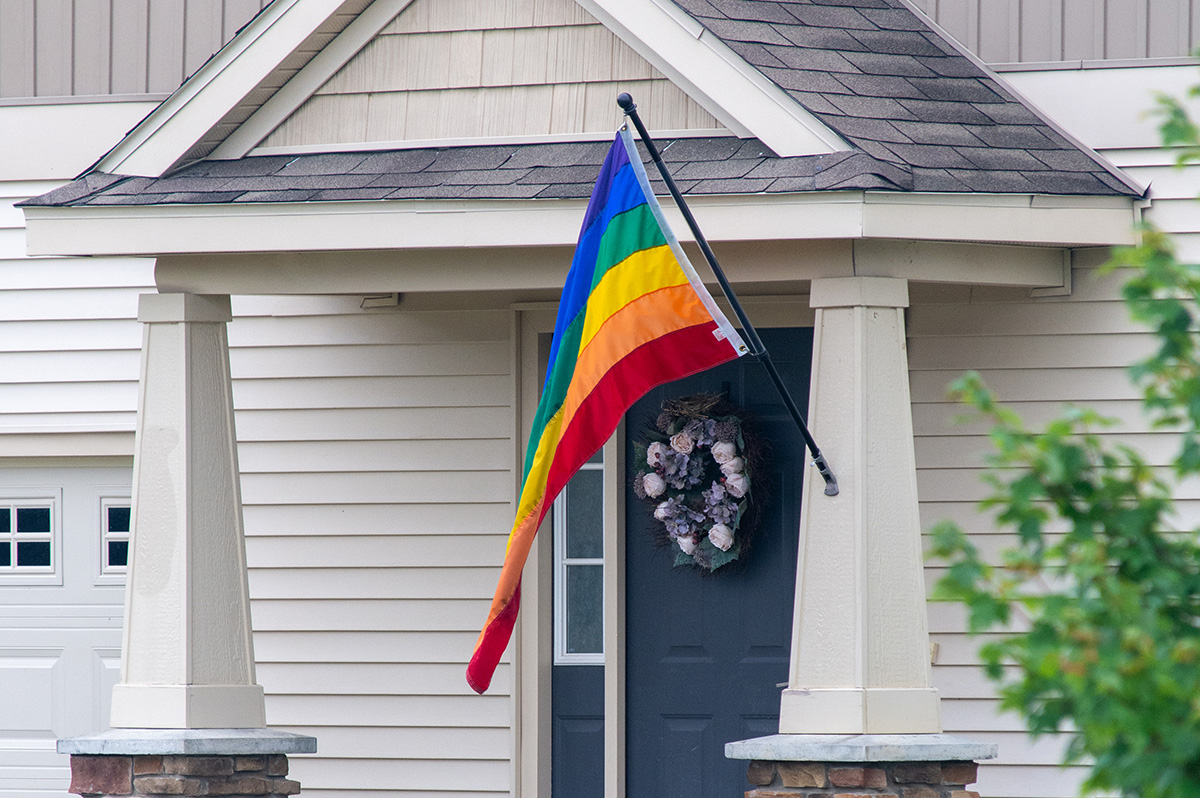Living
America’s first gay vice president?
‘Lifelong bachelor’ William Rufus King lived with President Buchanan

Editor’s note: This is the first installment in a month-long series profiling prominent figures in American history who were gay (or rumored to be) as part of the National Gay History Project commemorating LGBT History Month. For more coverage, visit washingtonblade.com.
William Rufus DeVane King, the 13th United States vice president, has the distinction of having served in that office for less time than any other vice president.
He died of tuberculosis on April 18, 1853, just 25 days after being sworn into office on March 24, 1853, according an official biography of King prepared by the Office of the Historian of the U.S. Senate.
Other historians have speculated that King holds yet another distinction — the likely status of being the first gay U.S. vice president and possibly one of the first gay members of the U.S. House of Representatives and the U.S. Senate.

William Rufus DeVane King, the 13th United States vice president, is believed by some historians to have been gay. He holds the distinction of being sworn into office on foreign soil, while in Cuba for health reasons.
King (1786-1853) served in the House of Representatives from North Carolina for six years beginning in 1811 and later served in the Senate from the newly created state of Alabama from 1819-44, when he became U.S. minister to France.
He returned to the Senate four years later, in 1848, where he served until December 1852, when he resigned after winning election in November 1852 as vice president on the ticket of Franklin Pierce.
A lifelong bachelor, King lived for 15 years in the home of future U.S. president James Buchanan while the two served in the Senate. Buchanan, also a lifelong bachelor, is believed by some historians to be the nation’s first gay president.
“They certainly didn’t have the word gay back then,” said Paul F. Boller Jr., professor emeritus of history at Texas Christian University and author of several books on presidential politics, including the book “Presidential Campaigns: From George Washington to George W. Bush.”
In a telephone interview, Boller said Washington insiders at the time speculated over whether King and Buchanan’s well-known close friendship had evolved into a romantic relationship.
“I don’t think the word homosexual was used either,” Boller said. “So they’d sort of use the term ‘a little feminine’ and all of that.”
Boller and historian Jean H. Baker, professor of history at Maryland’s Goucher College and author of a biography of Buchanan, each cite reports that President Andrew Jackson referred to King as “Miss Nancy” and “Aunt Fancy.” Aaron V. Brown, who became U.S. postmaster general while Buchanan was president, reportedly referred to King as Buchanan’s “wife.”
Baker reports in her Buchanan biography that King’s and Buchanan’s nieces reportedly destroyed their uncles’ correspondence with each other, fueling speculation that the two men were in a gay relationship that their families wanted to conceal.
In one letter that survived, Buchanan expressed sadness over King’s departure from his house in 1844 to become the U.S. envoy to France.
“I am now solitary and alone, having no companion in the house with me,” Buchanan wrote. “I have gone a wooing to several gentlemen, but have not succeeded with any one of them.”
King’s relationship with Buchanan, who was from Pennsylvania, could have been a factor in Buchanan’s sympathy for the South during Buchanan’s tenure as a senator and later as president from 1857-61.
Most accounts by historians of King’s political career portray him as a moderate southerner who supported slavery while emerging as a strong unionist. King voiced opposition in the Senate to calls by some of his fellow southerners for the South to secede from the United States during the tense decade prior to the Civil War.
“From such a calamity may God in His mercy deliver us,” King wrote in expressing opposition to the growing calls for secession.
King was born in 1786 in Sampson County, N.C., to a family of wealthy planters. His father owned more than two-dozen slaves, the Office of the Senate Historian reports in its biography of King.
It says King attended an elite preparatory school before attending the University of North Carolina, where he studied law. Following a legal apprenticeship, he was admitted to the state bar in 1805 and began a legal practice. He served in the North Carolina Legislature from 1808-09 and won election in 1810 to the U.S. House and began serving as a congressman in 1811 at age 25.
He resigned from the House in 1816 to enter the world of diplomacy by taking a job as legation secretary for William Pinkney, who was appointed by President James Monroe as U.S. minister to Russia in St. Petersburg. King returned to the U.S. in 1818, when he moved from North Carolina to the territory of Alabama, becoming one of the leaders of the Alabama statehood movement.
The Senate historian’s biography says King purchased 750 acres of land in Alabama and established a plantation. He later joined others to form a land company that founded the town of Selma, which King reportedly named. In December 1819, he became one of Alabama’s first two U.S. senators.
As a moderate Democrat, King became an early supporter of Andrew Jackson’s quest to become president, the Senate biography says. It quotes an unnamed critic of King as describing him as a “tall, prim, wig-topped mediocrity,” noting that King wore a wig “long after such coverings had gone out of fashion.”
The biography quotes a fellow senator as having this to say about King: “He was distinguished by the scrupulous correctness of his conduct. He was remarkable for his quiet and unobtrusive, but active practical usefulness as a legislator … To his honor be it spoken, he never vexed the ear of the Senate with ill-timed, tedious or unnecessary debate.”
The Encyclopedia of Alabama reports in a 2003 article that rumors circulating in Washington about King’s sexual orientation increased as his close friendship with Buchanan became widely known.
“Neither man ever married, and by 1836 they were sharing a residence in Washington,” the encyclopedia article says. “Any negative reactions to their relationship appear to have had little effect, and the men continued with their living arrangement and their work as legislators.”
By 1840, newspapers in Alabama supportive of the Democratic Party, of which King was a prominent member, promoted King as a vice-presidential running mate for incumbent President Martin Van Buren. Although King received little support outside Alabama for the vice-presidential nomination, he continued to position himself behind the scenes as a possible vice-presidential candidate for the next two decades, the Alabama Encyclopedia reports.
The Senate biography of King says President John Tyler interrupted King’s vice-presidential ambitions in 1844 when he nominated him to become U.S. minister to France and the Senate quickly confirmed the nomination by a lopsided margin.
The bio says King succeeded in his main mission to persuade France not to oppose U.S. plans to annex Texas, which the U.S. acquired following the Mexican-American War.
King returned to the Senate in 1848, two years after completing his service in France. In July 1850, King became the de facto U.S. vice president when President Zachary Taylor died in office and then-Vice President Millard Filmore became president, leaving the office of vice president vacant.
King’s Senate colleagues responded by unanimously selecting him as president pro tempore of the Senate, which normally would have placed him third in line to become president. With the vice president’s post vacant, King emerged as first in line to become president if Filmore were to die in office.
In 1852, after years of vying for the vice-presidential nomination, the constellations appeared to be in perfect alignment with Democratic Party politics for King’s longtime dream. After nominating Franklin Pierce for president on the 49th ballot, the Democratic Convention, convening in Baltimore, nominated King as Pierce’s running mate. In the ensuing months, King campaigned aggressively for the Pierce-King ticket, playing some role in Pierce’s victory in November 1852.
But biographers report that King’s coughing spells became increasingly frequent and painful, leading to a diagnosis of tuberculosis. By December 1852, King described himself to friends as “looking like a skeleton,” the Senate biography reports. Later that month he resigned from the Senate and made arrangements, at the advice of his doctor, to spend the winter in Cuba, where the warm, tropical climate would perhaps help him regain his health.
In early February 1853, King realized his condition was getting worse and he would not be well enough to travel to Washington in time for the March 4 inauguration ceremony.
Upon learning of King’s deteriorating health, Congress took the unusual step of passing a law allowing him to take the oath of office for vice president on foreign soil.
“On March 24, 1853, near Matanzas, a seaport town 60 miles from Havana, the gravely ill statesman, too feeble to stand unaided, became the nation’s 13th vice president,” his Senate biography says.
King boarded a ship to return to the U.S. in April 1853 and arrived home at his Alabama plantation on April 17. He died one day later at age 67.
David Durham, a University of Alabama professor of law and history, said in a Sept. 9 interview that it remains an open question whether King was gay. Durham said it’s also uncertain but a strong possibility that King played a role in shaping Buchanan’s policies and views on the issue of slavery in the years leading up to the Civil War.
“I don’t think anybody can prove it one way or the other,” he said in discussing King’s sexual orientation.
“A lot of the speculation comes from misinterpreting, I think, 19th century lifestyles, where men commonly slept in the same bed and thought nothing of it,” Durham said. “And the kind of terms of affection used in letters and correspondence between males — in our society now it’s like, umm, that’s very interesting. But they thought nothing of it and it didn’t mean there was some kind of romantic attachment,” he said.
“But that’s not to say that there wasn’t,” Durham added.
Real Estate
Convert rent check into an automatic investment, Marjorie!
Basic math shows benefits of owning vs. renting

Suppose people go out for dinner and everyone is talking about how they are investing their money. Some are having fun with a few new apps they downloaded – where one can round up purchases and then bundle that money into a weekly or monthly investment that grows over time, which is a smart thing to do. The more automatic one can make the investments, the less is required to “think about it” and the more it just happens. It becomes a habit and a habit becomes a reward over time.
Another habit one can get into is just making that rent check an investment. One must live somewhere, correct? And in many larger U.S. cities like New York, Chicago, D.C., Los Angeles, Miami, Charlotte, Atlanta, Dallas, Nashville, Austin, or even most mid-market cities, rents can creep up towards $2,000 a month (or more) with ease.
Well, do the math. At $2,000 per month over one year, that’s $24,000. If someone stays in that apartment (with no rent increases) for even three years, that amount triples to $72,000. According to Rentcafe.com, the average rent in the United States at the end of 2025 was around $1,700 a month. Even that amount of rent can total between $60,000 and $80,000 over 3-4 years.
What if that money was going into an investment each month? Now, yes, the argument is that most mortgage payments, in the early years, are more toward the interest than the principal. However, at least a portion of each payment is going toward the principal.
What about closing costs and then selling costs? If a home is owned for three years, and then one pays out of pocket to close on that home (usually around 2-3% of the sales price), does owning it for even three years make it worth it? It could be argued that owning that home for only three years is not enough time to recoup the costs of mostly paying the interest plus paying the closing costs.
Let’s look at some math:
A $300,000 condo – at 3% is $9,000 for closing costs.
One can also put as little as 3 or 3.5% down on a home – so that is also around $9,000.
If a buyer uses D.C. Opens Doors or a similar program – a down payment can be provided and paid back later when the property is sold so that takes care of some of the upfront costs. Knowledgeable lenders can often discuss other useful down payment assistance programs to help a buyer “find the money.”
Another useful tactic many agents use is to ask for a credit from the seller. If a property has sat on the market for weeks, the seller may be willing to give a closing cost credit. That amount can vary. New construction sellers may also offer these closing cost credits as well.
And that, Marjorie, just so you will know, and your children will someday know, is THE NIGHT THE RENT CHECK WENT INTO AN INVESTMENT ACCOUNT ON GEORGIA AVENUE!
Joseph Hudson is a referral agent with Metro Referrals. Reach him at 703-587-0597 or [email protected].

Some vehicles age quietly — but not muscle cars.
For 2026, the Chevrolet Corvette tightens its focus, fixes one glaring flaw (the previously dowdy interior) and flaunts a futuristic design. The Dodge Charger, on the other hand, is loud and proud, daring you to ignore its presence at your peril.
CHEVROLET CORVETTE
$73,000-$92,000
MPG: 16 city/25 highway
0 to 60 mph: 2.8 seconds
Cargo space: 13 cu. ft.
PROS: Awesome acceleration. Race-car feel. Snazzy cabin.
CONS: No manual transmission. No rear seat. Tight storage.
Finally, the Chevrolet Corvette feels as good inside as it looks flying past you on the freeway. That’s thanks to the classy, completely redesigned cabin. Gone is the old, polarizing wall of buttons in favor of a sleeker, three-screen cockpit. There’s a large digital gauge cluster, a wide infotainment screen angled toward the driver, and a marvy new auxiliary display. Everything is modern and a bit glitzy — but in a good way.
Fit and finish are higher quality than before, and the controls are more intuitive. Chevy’s Performance App is now standard across trims, offering real-time data for drivers who enjoy metrics as much as momentum. And the new interior color schemes, including slick asymmetrical options, let you express yourself without screaming for attention—confidence, not obnoxious bluster.
As for handling, the steering is quick and sure, body control is exceptional, and acceleration is blazingly fast. A mid-engine layout also delivers sublime balance.
Three trim options, including the V8-powered Stingray, the E-Ray (also with a V8 but paired with electric all-wheel drive), and the Z06 and ZR1 variants for racing devotees.
(Note to self: For a truly mind-blowing experience, there’s the new 1,250-horsepower ZR1X all-electric supercar that goes from 0 to 60 mph in less that 2 seconds and is priced starting at $208,000.)
Yes, the ride in any of these Corvettes can be firm. And visibility is, well, rather compromised. But this supercar is a total Dom, not a timid sub. Think Alexander Skarsgard in “Pillion,” and you get the picture.
DODGE CHARGER

$52,000-$65,000
MPG: 16 city/26 highway
0 to 60 mph: 3.9 seconds
Cargo capacity: 22.75 cu. ft.
PROS: Choice of gas or EV power. Modern tech. Spacious cabin.
CONS: No V8 engine (yet). Soft steering. Less-than-lithe cornering.
Everything old is new again for the Dodge Charger. The automaker initially was phasing out gas-powered models in a shift to electric vehicles but then quickly pivoted back to include gas engines after yo-yo regulatory changes this year from, well, the yo-yos in the White House.
Powerful twin-turbo engines in the R/T and Scat Pack trims produce up to 550 horsepower. These models come standard with all-wheel drive but can be switched to rear-wheel drive for classic muscle-car antics when the mood strikes you.
At the same time, Dodge still offers the electric Charger Daytona, delivering up to 670 horsepower and ferocious straight-line acceleration.
The Charger’s aggressive design, massive digital displays and practical hatchback layout carry over, reinforcing its ability to be both a performance diva and everyday companion. With the larger-than-expected storage space, I appreciated being able to fit a boatload of groceries in the trunk during a Costco run.
New wheel designs, paint choices and trim variations help you visually distinguish between gas and electric Chargers. But no matter the model, each one feels decisive and deliberate on the road. Commuting in stop-and-go traffic during rush hour is fine, but this street machine excels at high-speed cruising on the freeway.
The turbo six-cylinder engine delivers muscular torque with less drama than the old V8s, but still with plenty of urgency. The electric Daytona version is a different kind of thrill, with its instant, silent thrust that feels like it could almost launch you to the moon.
Steering is stable but not exactly crisp, and the Charger’s weight makes it less lithe—and lively—than other muscle cars, especially when navigating tight corners.
But that’s just fine with me. Like Bea Arthur as Dorothy in “The Golden Girls,” this no-nonsense muscle car is proud to be big, bold and brassy.
Real Estate
Top buyer-friendly markets for the LGBTQ community
Home should be a place where you can be fully yourself

Buying or selling a home is one of the most meaningful financial and emotional decisions a person can make. For LGBTQ+ individuals and families, that journey can also come with unique considerations — from finding truly inclusive neighborhoods to working with professionals who understand and respect who you are.
The good news? Across the United States, there are increasingly buyer-friendly housing markets where LGBTQ+ home buyers and sellers can find opportunity, affordability, and community. When paired with the right representation, these markets can offer not only strong financial value, but peace of mind.
For more than 30 years, GayRealEstate.com has been the leading source of LGBTQ+ real estate representation, helping LGBTQ+ buyers and sellers connect with vetted, LGBTQ+ friendly real estate agents who understand the nuances of fair housing, legal protections, and inclusive service.
Below, we explore top buyer-friendly markets for the LGBTQ+ community, along with practical tips to help you navigate the process with confidence.
What Makes a Market Buyer-Friendly?
A buyer-friendly market isn’t just about lower prices — especially for LGBTQ+ home buyers. It often includes:
- Increased housing inventory (more choices, less pressure)
- Slower price growth or stabilized pricing
- Greater negotiating power for buyers
- Established or emerging LGBTQ+ communities
- Local protections and inclusive policies
- Access to LGBTQ+ friendly real estate agents and resources
Markets that combine affordability with inclusivity can be especially attractive for first-time gay home buyers, same-sex couples, and LGBTQ+ families planning for long-term stability.
Top Buyer-Friendly Markets for LGBTQ Home Buyers
1. Austin & San Antonio, Texas
Once known for extreme competition, many Texas metros have shifted into more buyer-friendly territory due to increased inventory.
Why it works for LGBTQ+ buyers:
- Strong LGBTQ+ communities, especially in Austin
- More negotiating leverage than in prior years
- Diverse neighborhoods at varying price points
Tip: Texas does not have statewide LGBTQ+ housing protections, making it especially important to work with an experienced LGBTQ+ friendly realtor through GayRealEstate.com.
2. Columbus & Cincinnati, Ohio
Ohio cities continue to attract buyers looking for value without sacrificing culture or inclusivity.
Why it works:
- Lower median home prices
- Growing LGBTQ+ populations
- Strong healthcare, education, and job markets
These cities are particularly appealing for LGBTQ+ buyers relocating from higher-cost coastal markets.
3. Richmond, Virginia
Richmond has become a standout for LGBTQ+ home ownership thanks to affordability, history, and progressive growth.
Highlights:
- Inclusive local culture
- Buyer-friendly price trends
- Walkable neighborhoods popular with LGBTQ+ professionals
4. Minneapolis–St. Paul, Minnesota
The Twin Cities consistently rank high for LGBTQ+ quality of life and legal protections.
Why LGBTQ+ buyers love it:
- Strong anti-discrimination laws
- Stable home values
- Excellent resources for LGBTQ+ families
Minnesota offers one of the safest environments for LGBTQ+ home buyers and sellers navigating the real estate process.
5. Jacksonville & Tampa Bay, Florida
Florida remains complex for LGBTQ+ buyers, but some metros still offer strong buyer opportunity.
What to know:
- Increased inventory = more negotiating power
- Coastal lifestyle at lower cost than South Florida
- Local LGBTQ+ communities continue to grow
Because statewide protections vary, partnering with a GayRealEstate.com LGBTQ+ friendly real estate agent is essential.
Finding LGBTQ-Friendly Neighborhoods
Not every “affordable” neighborhood is inclusive — and safety, comfort, and belonging matter.
When searching for LGBTQ+ friendly neighborhoods:
- Look for visible LGBTQ+ organizations, events, and businesses
- Research local non-discrimination ordinances
- Ask your agent about lived experiences, not just statistics
- Talk to neighbors and local LGBTQ+ groups
Agents in the Gay Real Estate Network often provide insight that listing data alone cannot.
The Importance of LGBTQ Real Estate Representation
While fair housing laws exist, LGBTQ+ housing discrimination still happens — sometimes subtly, sometimes overtly.
Working with an LGBTQ+ friendly real estate agent helps ensure:
- Respectful communication
- Advocacy during negotiations
- Awareness of legal protections
- A safer, more affirming experience
GayRealEstate.com has spent over three decades building the most trusted network of gay realtors, lesbian real estate agents, and LGBTQ+ friendly real estate professionals nationwide.
Legal Protections Every LGBTQ Buyer and Seller Should Know
Federal protections now include sexual orientation and gender identity under the Fair Housing Act, but enforcement and local laws vary.
Before buying or selling:
- Understand your state and local protections
- Know how to document discriminatory behavior
- Work with professionals who take advocacy seriously
- Use trusted LGBTQ+ real estate resources
GayRealEstate.com agents are experienced in helping clients navigate these realities with confidence.
Tips for LGBTQ Home Buyers & Sellers
- Get pre-approved early to strengthen your buying position
- Interview agents and ask direct questions about LGBTQ+ experience
- Don’t ignore your instincts — comfort matters
- Plan long-term: community, schools, healthcare, and protections
- Use LGBTQ+-specific resources rather than generic searches
Buyer-friendly markets create opportunity — but representation creates security.
Whether you’re a first-time gay home buyer, a same-sex couple relocating, or an LGBTQ+ seller preparing for your next chapter, choosing the right market and the right representation makes all the difference.
For over 30 years, GayRealEstate.com has been the trusted leader in LGBTQ+ real estate, connecting buyers and sellers with professionals who understand the importance of inclusion, advocacy, and respect.
Your home should be more than a place to live — it should be a place where you can be fully yourself.
Scott Helms is president and owner of Gayrealestate.com.


















